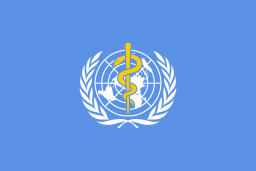World Health Organization (WHO)

Tel: +41 22 791 2111, Fax: +41 22 791 3111, Telex: 415 416
Telegraph: UNISANTE GENEVA
For more information: http://www.who.int
1211 Geneva 27 Switzerland
The World Health Organization is the United Nations specialized agency for health. It was established on 7 April 1948. WHO is the directing and coordinating authority for health within the United Nations system. It is responsible for providing leadership on global health matters, shaping the health research agenda, set- ting norms and standards, articulating evidence-based policy options, providing technical support to countries and monitoring and assessing health trends.
WHO is governed by 193 Member States through the World Health Assembly. The main tasks of the World Health Assembly are to approve the WHO programme and the budget for the following biennium, and to decide major policy questions.
Selected TCB programmes and initiatives in this guide
Trilateral cooperation on public health related aspects of intellectual property rights
Since the adoption of the WHO Global Strategy and Plan of Action on Public Health, Innovation and Intellectual Property, WHO, WIPO and WTO have intensified their collaboration on public health and intellectual property.
This Trilateral Cooperation is meant to foster a better understanding of the linkage between public health and intellectual property policies and to enhance a mutually supportive implementation of those policies. The three Secretariats are since working together more closely, so that each can fulfill its own mandate more effectively. This collaboration will also ensure that their initiatives support each other, efforts are not duplicated, and resources are used efficiently, for example in technical assistance and capacity building.
Most recently, the three Organizations have published a study on “Promoting Access to Medical Technologies and Innovation - Intersections between public health, intellectual property and trade”. A collaborative effort by the three Secretariats, the study is intended to inform ongoing technical cooperation activities undertaken by the three organizations and to support policy discussions. Based on many years of field experience in technical cooperation, the study has been prepared to serve the needs of policy-makers who seek a comprehensive presentation of the full range of issues, as well as lawmakers, government officials, delegates to international organizations, non-governmental organizations and researchers:
http://www.who.int/phi/promoting_access_medical_innovation/en/index.html
For more information on the trilateral cooperation in general:
http://www.who.int/phi/implementation/trilateral_cooperation/en/index.html
